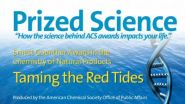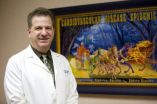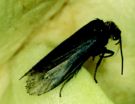Mayo Clinic study finds aggressive surgery is best for children with brain tumors
Where complete tumor removal not possible, radiation therapy yields similar results
2010-11-23
(Press-News.org) ROCHESTER, Minn. -- A new Mayo Clinic study (http://newsblog.mayoclinic.org/2008/12/03/brain-tumors-best-treatments-for-long-term-survival/) found that children with low-grade brain tumors (gliomas) (http://www.mayoclinic.org/brain-tumors/) who undergo aggressive surgery to completely remove the tumor have an increased chance of overall survival. If complete removal is not possible, adding radiation therapy to a less complete surgery provides patients with the same outcomes as a complete removal. This study was presented at the Society for NeuroOncology Annual Scientific Meeting and Education Day in Montreal on Nov. 21.
"This study further reinforces Mayo Clinic's practice of aggressive surgical resection," says Nadia Laack, M.D., a Mayo Clinic radiation oncologist and the study's lead author. "We found that when compared to previous studies, more children are now able to have complete removals, most likely due to the fact that we have better neurosurgical techniques and better imaging techniques that help guide the surgeons."
As part of an ongoing study, Dr. Laack and a team of Mayo Clinic researchers identified 127 consecutive pediatric patients with World Health Organization Grade I and Grade II low-grade gliomas treated at Mayo Clinic between 1990 and 2005. Of those, 90 patients had complete removal of their tumor and 20 patients had subtotal resections with added radiation therapy. Results showed that greater than 89 percent of the patients are surviving more than 10 years later.
When combined with results from a previous Mayo Clinic study, this is the largest group of patients reported and was conducted through long-term follow-up by the Mayo Clinic team.
"This is great news for families because it shows that even if a complete surgery isn't possible, adding radiation to a less than complete surgery reduces their chances of tumor progression to yield the same outcome as if there was a complete removal," says Dr. Laack.
### Other members of the research team included Shariq Khwaja, Nicholas Wetjen, M.D., and Paul D. Brown.
About Mayo Clinic
Mayo Clinic is a non-profit worldwide leader in medical care, research, and education for people from all walks of life. For more information, visit www.mayoclinic.org/about/ and www.mayoclinic.org/news.
END
ELSE PRESS RELEASES FROM THIS DATE:
2010-11-23
WASHINGTON, Nov. 22, 2010 — The science that helped make today's smartphones and iPods smaller but more powerful than yesterday's desktop computers highlights the latest episode in the American Chemical Society (ACS) Prized Science video series.
The new high-definition video, released today, focuses on IBM chemist Robert Miller, winner of the 2010 ACS Award for Chemistry of Materials. Miller developed materials that helped pack more transistors onto each computer chip, those postage stamp-size slivers of silicon that make up the brains of computers and other electronic ...
2010-11-23
New findings by civil engineering researchers in the University of Minnesota's College of Science and Engineering shows that treating municipal wastewater solids at higher temperatures may be an effective tool in the fight against antibiotic-resistant bacteria.
Heating the solid waste to 130 degrees Fahrenheit (55 degrees Celsius) was particularly effective in eliminating the genes that confer antibiotic resistance. These genes are used by bacteria to become resistant to multiple antibiotics, which are then known as "superbacteria" or "superbugs."
The research paper ...
2010-11-23
More and more people have become aware of the dangers of excessive fructose in diet. A new review on fructose in an upcoming issue of the Journal of the American Society of Nephrology (JASN) indicates just how dangerous this simple sugar may be.
Richard J. Johnson, MD and Takahiko Nakagawa, MD (Division of Renal Diseases and Hypertension, University of Colorado) provide a concise overview of recent clinical and experimental studies to understand how excessive amounts of fructose, present in added sugars, may play a role in high blood pressure, diabetes, obesity, and ...
2010-11-23
RIVERSIDE, Calif. – Elderly adults can improve their vision with perceptual training, according to a study from the University of California, Riverside and Boston University that has implications for the health and mobility of senior citizens.
The study, "Perceptual learning, aging, and improved visual performance in early stages of visual processing," appears in the current online issue of the Journal of Vision. It was funded by a $3.5 million grant from the National Institute on Aging.
UCR researchers G. John Andersen, professor of psychology; Rui Ni, formerly a postdoctoral ...
2010-11-23
The same powerful drugs that have extended the lives of countless people with HIV come with a price – insulin resistance that can lead to diabetes and cardiovascular disease.
Now, researchers at Washington University School of Medicine in St. Louis have determined why that happens. Their research shows that HIV protease inhibitors directly interfere with the way blood sugar levels are controlled in the body. This leads to insulin resistance, a condition that occurs when the body produces enough insulin but doesn't use it properly.
This confirmation provides the potential ...
2010-11-23
U.S. academic institutions awarded 49,562 research doctorate degrees in 2009, the highest number ever reported by the National Science Foundation's Survey of Earned Doctorates (SED), and a 1.6 percent increase over 2008's total of 48,802.
The SED is an annual census of all individuals who receive a research doctorate from a U.S. academic institution in an academic year, which is July 1 through June 30 of the following year. The 2009 census covered individuals who earned doctorates in the academic year ending June 2009. NSF's Science Resources Statistics division compiled ...
2010-11-23
The following highlights summarize research papers that have been recently published in Geophysical Research Letters (GRL), Water Resources Research (WRR), and Journal of Geophysical Research - Earth Surface (JGR-F).
In this release:
Changing winds can influence amounts of carbon dioxide the ocean holds
Large methane release from ocean sediments during glacial periods?
Magnetic island observed at Earth's magnetopause
Understanding particle movement improves models of stream erosion and deposition
New method for assessing uncertainty in groundwater models
...
2010-11-23
WEST LAFAYETTE, Ind. - Purdue University scientists have found the last undiscovered gene responsible for the production of the amino acid phenylalanine, a discovery that could lead to processes to control the amino acid to boost plants' nutritional values and produce better biofuel feedstocks.
Natalia Dudareva, a distinguished professor of horticulture, and Hiroshi Maeda, a postdoctoral researcher in Dudareva's laboratory, determined that the gene is one of 10 responsible for phenylalanine production in plants. Understanding how the amino acid is produced could provide ...
2010-11-23
Biologists have long thought that interactions between plants and pollinating insects hasten evolutionary changes and promote biological diversity. However, new findings show that some interactions between plants and pollinators are less likely to increase diversity than previously thought, and in some instances, reduce it.
Findings, published in the Journal of Evolutionary Biology, show that local populations of one of the most distinctive plants in the Mojave Desert, the Joshua tree, are not as biologically diverse as would be expected. Joshua trees cannot produce seeds ...
2010-11-23
Upper-class people have more educational opportunities, greater financial security, and better job prospects than people from lower social classes, but that doesn't mean they're more skilled at everything. A new study published in Psychological Science, a journal of the Association for Psychological Science, finds surprisingly, that lower-class people are better at reading the emotions of others.
The researchers were inspired by observing that, for lower-class people, success depends more on how much they can rely on other individuals. For example, if you can't afford ...
LAST 30 PRESS RELEASES:
[Press-News.org] Mayo Clinic study finds aggressive surgery is best for children with brain tumors
Where complete tumor removal not possible, radiation therapy yields similar results


